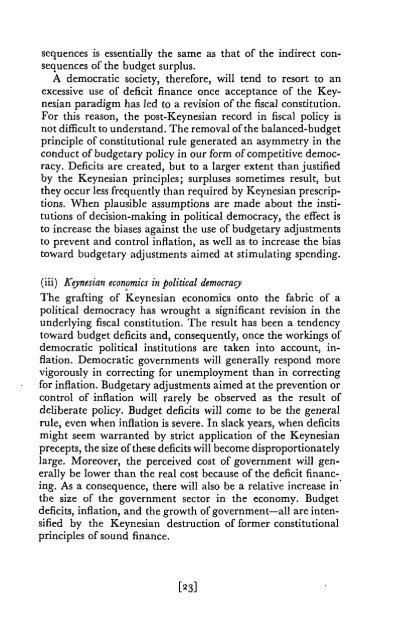THE CONSEQUENCES OF MR KEYNES.pdf - Institute of Economic ...
THE CONSEQUENCES OF MR KEYNES.pdf - Institute of Economic ...
THE CONSEQUENCES OF MR KEYNES.pdf - Institute of Economic ...
You also want an ePaper? Increase the reach of your titles
YUMPU automatically turns print PDFs into web optimized ePapers that Google loves.
sequences is essentially the same as that <strong>of</strong> the indirect consequences<br />
<strong>of</strong> the budget surplus.<br />
A democratic society, therefore, will tend to resort to an<br />
excessive use <strong>of</strong> deficit finance once acceptance <strong>of</strong> the Keynesian<br />
paradigm has led to a revision <strong>of</strong> the fiscal constitution.<br />
For this reason, the post-Keynesian record in fiscal policy is<br />
not difficult to understand. The removal <strong>of</strong>the balanced-budget<br />
principle <strong>of</strong> constitutional rule generated an asymmetry in the<br />
conduct <strong>of</strong> budgetary policy in our form <strong>of</strong> competitive democracy.<br />
Deficits are created, but to a larger extent than justified<br />
by the Keynesian principles; surpluses sometimes result, but<br />
they occur less frequently than required by Keynesian prescriptions.<br />
When plausible assumptions are made about the institutions<br />
<strong>of</strong> decision-making in political democracy, the effect is<br />
to increase the biases against the use <strong>of</strong> budgetary adjustments<br />
to prevent and control inflation, as well as to increase the bias<br />
toward budgetary adjustments aimed at stimulating spending.<br />
(iii) Keynesian economics in political democracy<br />
The grafting <strong>of</strong> Keynesian economics onto the fabric <strong>of</strong> a<br />
political democracy has wrought a significant revision in the<br />
underlying fiscal constitution. The result has been a tendency<br />
toward budget deficits and, consequently, once the workings <strong>of</strong><br />
democratic political institutions are taken into account, inflation.<br />
Democratic governments will generally respond more<br />
vigorously in correcting for unemployment than in correcting<br />
for inflation. Budgetary adjustments aimed at the prevention or<br />
control <strong>of</strong> inflation will rarely be observed as the result <strong>of</strong><br />
deliberate policy. Budget deficits will come to be the general<br />
rule, even when inflation is severe. In slack years, when deficits<br />
might seem warranted by strict application <strong>of</strong> the Keynesian<br />
precepts, the size <strong>of</strong> these deficits will become disproportionately<br />
large. Moreover, the perceived cost <strong>of</strong> government will generally<br />
be lower than the real cost because <strong>of</strong> the deficit financing.<br />
As a consequence, there will also be a relative increase in<br />
the size <strong>of</strong> the government sector in the economy. Budget<br />
deficits, inflation, and the growth <strong>of</strong> government—all are intensified<br />
by the Keynesian destruction <strong>of</strong> former constitutional<br />
principles <strong>of</strong> sound finance.<br />
[23]












